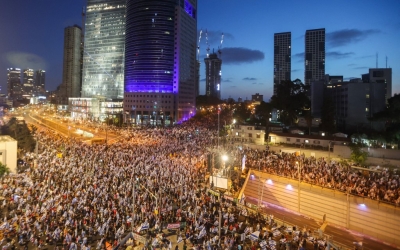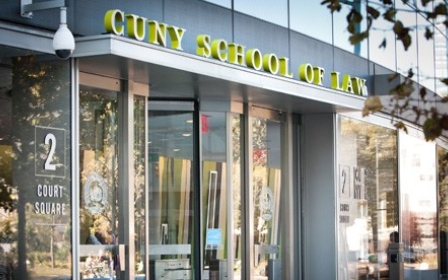Israel advances law preventing Palestinian citizens from living in 'Jewish areas'

The Israeli government is advancing legislation to "Judaize" the Galilee, a region in northern Israel with a significant Palestinian population.
The move is part of a deal that was struck to form Israel's new government last year with far-right politicians Bezalel Smotrich and Itamar Ben-Gvir, who want to expand Jewish settlement in the region.
As part of the plan to "save Jewish settlement in the Galilee," Prime Minister Benjamin Netanyahu plans to significantly strengthen a controversial 2011 law that would give small communities powers to vet prospective newcomers.
When the law was passed the goal was to bypass a Supreme Court ruling forbidding residential communities from leasing land only to Jews.
The laws give "almost complete discretion" to these small communities to choose who lives there, said Suhad Bishara from Adalah, the Legal Center for Arab Minority Rights in Israel.
"In practice, this arrangement is, principally, a tool for screening out Palestinian citizens and preventing their residence in these communities and constitutes a legal mechanism for residential segregation in many localities in the State of Israel," said Bishara, speaking to Middle East Eye.
Earlier this month, Israeli Justice Minister Yariv Levin said that the purchase of houses by Palestinians in towns and cities in Israel was pushing Jewish people to leave these areas.
"Arabs buy apartments in Jewish communities in the Galilee and this causes Jews to leave these cities because they are not ready to live with Arabs," said Levin.
Now the Israeli government is to "expand this system and deepen it," said Bishara.
The government has committed to increase the number of towns able to select newcomers from those with 400 households to those with up to 1,000 households.
The expansion of the law is also supported by a number of opposition parliamentarians. The first reading of the bill that would have allowed towns with up to 600 households to screen who moves in was passed under the former government.
The law officially does not allow acceptance committees to reject resident candidates for reasons of race, religion, gender, nationality, disability, class, age, parentage, sexual orientation, country of origin, views or party political affiliation.
However, the wording of the 2011 law allows committees to reject candidates who they deem to be "inappropriate for the social and cultural fabric" of the community.
'Blatant violation of human rights law'
The Israeli cabinet earlier this month also discussed a new proposal to assert "Zionist values" in government policy, which critics have argued could enable Jewish Israelis to receive preferential treatment in housing planning and construction.
Palestinian citizens of Israel who live in the Negev (Naqab) region have long accused the Israeli government of attempting to uproot them through various tactics.
Those include confiscation of lands from Palestinians and turning landowners into tenants. Additionally, the Israeli government has been accused of preventing the expansion of Palestinian villages and encircling them with new Jewish settlements.
The new law is set to also be expanded to the occupied West Bank in areas where Israel has annexed territory that also includes Palestinians.
Bishara said the bill, if passed as is, could be "open for constitutional examination in regard to its applicability in Israel."
"This is a blatant violation of international humanitarian law and human rights law, which apply to the West Bank, as an occupied territory," warned Bishara.
"If passed, this will lead to the deepening of the mechanism of de facto annexation of occupied territories and could be considered part of a de jure annexation process, in absolute contravention of the laws of occupation," she added.
Middle East Eye propose une couverture et une analyse indépendantes et incomparables du Moyen-Orient, de l’Afrique du Nord et d’autres régions du monde. Pour en savoir plus sur la reprise de ce contenu et les frais qui s’appliquent, veuillez remplir ce formulaire [en anglais]. Pour en savoir plus sur MEE, cliquez ici [en anglais].





